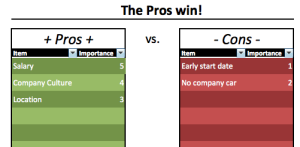Top job candidates get the most out of the questions at the end of the interview.
Because on one hand, these questions are useful and the best bet you have to learn about the position and company. You know how the saying goes, right from the horse’s mouth.
Want to know about the expectations of the role you’re applying for? What kind of team you’ll be working on? What makes the company a special place to work?
You have access to direct information right from the source who would know the most about it.
Could a hiring manager lie and sugarcoat some answers to your questions, for example? Sure, but I’ve found for the most part these answers are truthful.
Ask quality questions and you’ll get insightful answers to help you narrow down if the job is right for you. That’s already helpful.
In addition, these questions mark your final opportunity to leave a lasting impression—positive or negative—on the hiring manager.
Candidates who are prepared with a few questions avoid getting tripped up by this final interview task, and they create a positive impression.
Your questions can show you’re qualified and interested in the job, which are two qualities that a hiring manager wants in every applicant.
Can’t think of any good questions or ask poor ones, and you’ll shoot yourself in the foot along with these other common interview mistakes.
To help you out in your job search, I came up with 15 possible questions to ask at the end of the interview. (To be extra clear, just pick and choose a few of these questions—anymore and you’ll both overwhelm the poor guy or girl across from you and be labeled a weirdo.)
[activecampaign form=3]
Questions To Ask At The End Of An Interview
1. What qualities would an ideal applicant for this position possess?
Although most of the qualities are in the job description, sometimes you can be surprised about what they respond to this. And I like this question because it will point you toward what skills or experiences to highlight in the next interview. If the company says they want these qualities and you have them, it’s easy for them to put two and two together.
2. What does a typical day look like for someone in this position?
If you can’t stand meetings, and they respond that each morning is filled with 8 back-to-back meetings, then you might want to work somewhere else. And if you’re an extrovert or introvert, it helps to know how much people time you’ll be getting each day.
3. How would you describe this company’s culture?
Culture is key for most people. If you don’t enjoy the people and environment you work in, it’s going to be hard to love your job and commute to it every morning. A subset of this question is asking about the age of most employees and what do they do for lunch, after work, or on the weekends.
4. How do you measure success for this position?
Ask this and you’ll learn both about the position and how to be successful in it. For example, it could be that you thought the marketing company only cared about revenue generated from their ads, but they really care most about engagement.
5. What are your expectations for the person in this role for the first month, six months, and year?
Asking this question will give you insight into what is expected and by when. If the expectations are under what you expected, in your head you might question how challenging the role is. And if they seem over the top, then you need to know that if you take this job you have to bring your A-game or you risk getting fired.
6. What are the biggest challenges of this position?
You can also directly ask them what are the main challenges. While hopefully they will give you an honest answer, I believe you can also do research or talk to someone in a similar role to get a clearer picture of what you’re up against.
7. What are the biggest strengths of this company?
You can never learn too much about what the company does well, how it competes with its competitors, and how it performs in the market. If you’re applying for sales jobs, I’d ask this because it’s frustrating to try to sell a service or product that not many people want—regardless of how good you are as a salesman.
8. What does the training process involve?
Some jobs are highly technical in nature and require months of training. Other jobs, you’ll start from day one and learn as you go. It’s helpful to know which is which before you accept a job offer that you’re not trained for.
9. What manager or team would I be working with? And can you tell me more about them?
Again, who you work with matters a great deal to your satisfaction level at a job. By asking about the manager or team, you share your interest in the job and diligence—employers like this.
10. Where do you believe this company is headed in the next 5 years?
When companies grow, the employees are happier, they make more money, and they have less concerns about job security. And no one wants to work somewhere that is going to regress or go out of business in the future. So, especially if you’re applying for startup jobs, this is a great question to ask.
11. What’s unique about this company compared to its competitors?
Here you give the interviewer a pitch to sell their company to you. Based on their answer, you will learn more about the company and if it seems like the perfect fit for you. This is a good question to ask if you have multiple offers in the same industry.
12. Does this position offer opportunities for career advancement? And what are those normally?
The last thing you want to do is sign a contract for a position with no vertical promotions available. Then you could be stuck in the same role 5 years down the road with nothing to show for your hard work. By asking this, you also gain insight into other roles that you could grow into in the future.
13. What do you enjoy most about working at this company?
This is one of my favorite questions because it’s personal, so you’re both connecting with the interviewer and learning about the organization. And if they stutter or rip off some vague response, that could be a sign that they don’t enjoy working here much at all.
14. Are there any other questions I can answer or concerns I can address?
This is a safe question to use as your final question. It puts the ball back in their court and allows you to give one final piece of support in persuading the hiring manager that you’re the candidate for them.
15. What are the next steps in this interview process?
If you’re confident the job and company is what you want, and they seem to be interested in you, maybe you don’t have any specific questions. So it’s perfectly professional and smart to ask what are the next steps. This question will highlight your excitement and interest in the job. Just be careful not to be too cocky, such as, “When I advance to the next round, what can I expect?” or too modest as in, “Assuming I get lucky and potentially advance, what are the next steps?”
Related: Write This Interview Thank You Note To Seal The Deal
[activecampaign form=3]



